|


|

|
|
List
of downloadable english researches:
Child Care For Poverty Reduction (2009)
S. Anandlakshmy & Mirai Chatterjee
This paper outlines the issues faced by the working poor in their quest for a better future for their children. It highlights ‘what exists today’ and ‘what we need to do’. It illustrates
I. Child care must be included in all programmes and action for workers' rights, especially for women workers' rights, poverty reduction and social protection,
II. At least one child care centre for every thousand persons in the population must be provided, and,
III. This service must be developed according to the needs and working hours of parents.
In addition, it should be preferably run by local women, known to the parents. They should obtain at least minimum wages with social security benefits. The childcare services should be provided in a holistic manner, including nutrition, health care and child development activities.
To summarize, child care is essential for all working people. In every country, workers, and especially women workers, accord a high priority to child care, both because they care for their children and because they need this service, if they are to work and survive. Child care is a right of all workers. It is an entitlement.
Moreover, this paper strengthens the need for an inclusion of universal childcare as a part of decent work, thereby, promoting well-being for all.
Click Here to download
|
Taking Care of Our Children: Ensuring Long Term Impact (2007)
SEWA Academy Research Unit
This study evaluates the impact of Child Care Centres (CCC) run by SEWA on the lives of the children and their families. It provides a comparative analysis of children who attended CCC against the ones who lived in the same environment, but did not attend a CCC. Some of the key findings of the study are:
I. The children attending SEWA's CCC had started taking interest in studies and their confidence level had improved,
II. Children from the CCC were by and large healthier than their non-SEWA counterparts,
III. They were also better behaved than their non-SEWA counterparts,
IV. Quality of life and income had increased for majority of mother, and
V. The expenditure on children had gone down.
This study has provided us with facts proving the positive impact of Childcare Centre on the children attending it. We sincerely hope that it will make a small contribution to bringing the issue of childcare back on the policy and funding agenda.
Click Here to download
|
Sahbhagi Yojana 2 Support Programme (SY2SP)
(2007)
The Sahbhagi Yojana 2 Support Programme (SY2SP) is an example of integrated slum improvement programmes, and the present study is the first step in evaluating its impact.
This report presents the results of an initial evaluation of the impact of the SY2SP, a slum improvement initiative in Ahmedabad, India. The project implementation is through a partnership between the Ahmedabad Municipal Corporation, the Gujarat Mahila Housing SEWA Trust (MHT), and slum residents themselves.
This report can only represent a first stage in evaluating SY2SP due to the short or non-existent amount of time between completion of some of the infrastructure work and the second survey. The report primarily presents a snapshot of the immediate impact of water and sanitation facilities.
Click Here to download
|
Impact study of computer training class at SEWA Academy (2006)
SEWA Academy has started basic computer training course along with Basic English training in August 2004, for adolescent girls from informal background. Later on considering market and participants demand Academy started advanced course in Tally and DTP.
The study performed to measure the impact on the trainees of both courses, their parents, teachers and employees. The aim was not only to measure computer skills in the girls, but also the personal impact related to their personality, confidence, interest in studies and overall development which help them in employment and self reliance. The feedback on its impact, will contribute to the planning of future training programs.
Click Here to download |
Sewa Movement Training (SMT) impact evaluation study (2006)
SEWA Movement Training (SMT) or Basic Leadership Training is a core, member orientation program, once offered to all members within the first two years of SEWA membership. SMT is the oldest and most frequently run of all the Academy’s training programs, with an average of 8 trainings delivered to groups of 27 women each month. A total of 674 SMT courses catering to a total of 15,802 members, have been conducted since the training was initiated in 1991.
The purpose of SMT is “to enable SEWA leaders to understand the organization, its values and Gandhian philosophy, as well as build their capacity and capabilities as leaders”.
Aim of the study is to examine participants’ reactions to SEWA Movement Training (SMT) and investigate its practical impact on SMT graduates & their communities to replicate the survey with SMT graduates from rural areas as resources become available. Also, the feedback on its impact, will contribute to the planning of future training programs.
Click Here to download |
Spending, saving and borrowing: Perceptions and experiences of girls in Gujarat (2006)
This report is the result of an exploratory study undertaken by SEWA Academy in partnership with the Population Council to better understand the savings patterns among adolescent girls and young women; the barriers they face in saving; and the control they exercise in operating the account and determining the use of their savings.
It also highlights the potential for increasing the involvement of adolescent and young women in savings activities and for designing appropriate and acceptable savings options and services for them. This study was a part of a larger project undertaken in collaboration with SEWA.
Click Here to download |
Influencing girls’ lives: Acceptability and effectiveness of a livelihoods skill building intervention in Gujarat (2006)
This report is the result of a collaborative study undertaken by SEWA and Population Council to evaluate the effectiveness of a pilot livelihood skills building programme for adolescent girls implemented by SEWA in Ahmedabad and Vadodara districts of Gujarat. The programme aimed to support adolescent girls aged 13-19 years to make a safe transition to adulthood, increase their life options and increase their negotiating power in public and private arenas, expand their knowledge and skills, and encourage positive reproductive and sexual health.
Click Here to download |
Midwifery as decent work: Case study of SEWA's experience in India (2006)
The research was carried out from June to August 2006 by the SEWA’s Academy Research Unit for SOLIDAR’s Jobs Jobs Jobs Project. The study involved interviews with 75 midwives working in villages in Ahmedabad district in Gujarat (western India).
This briefing is a summary of research in India into the role of “Dais” or midwives. The aim of the research was to investigate whether Dais’ expanded role as community health workers has improved their employment status and income and contributed to lowering maternal and infant Mortality.
Click Here to download |
|
Self Employed Women : A Profile of SEWA's
Membership (2006)
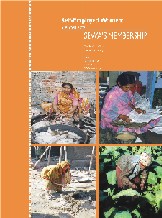 "Self Employed Women :
A Profile of SEWA's Membership" is part of a
project undertaken by SEWA Academy Visiting Professor, Dr.
Martha Chen of Harvard
University and
WIEGO. This project "SEWA at Thirty" takes place during
SEWA's thirtieth year. "Self Employed Women :
A Profile of SEWA's Membership" is part of a
project undertaken by SEWA Academy Visiting Professor, Dr.
Martha Chen of Harvard
University and
WIEGO. This project "SEWA at Thirty" takes place during
SEWA's thirtieth year.
The booklet gives the overview of SEWA’s Membership and in-depth
profiles of key trade groups among the members. The booklet presents
living standards, economic status and socila status of
SEWA's members. The booklet also describe the specific work arrangements
of nine of the large trade groups in SEWA's membership. The
booklet also includes how members of SEWA participate in the
organisation, the leadership that emerges from the general membership
and the solidarity that is built among the members.
Click Here to download
|
At the Kadiyanaka: Challenges faced by Construction Workers in Ahmedabad (2005)
Purshottam Vankar and SEWA Academy Research Team
|
| |
|
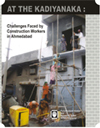 |
This publication is a follow up study on the construction workers of Ahmedabad City. It is based around 3 key factors: technical changes biased against informal worker and the response to these changes, increases in risk and vulnerability, and changes in the bargaining power of informal workers. The research also closely studies the nature of construction work and how participation in SEWA trainings has affected the work. |
|
| |
| Click Here to download |
|
Struggling for Survival: The Gum Collectors of Gujarat Revisited (2005)
Jignasa Dave and Grass Root Team for Banaskantha District
|
| |
|
This publication outlines the livelihoods of SEWA members who are gum collectors. It strives to document the processes followed by gum collectors to sell their product, to understand the various factors influencing the market economy of gum and consequent status of gum collectors, to assess the impact of interventions by SEWA, and identify emerging policy issues for providing social security to gum collectors.
|
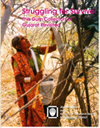 |
|
| Click Here to download |
|
Small and Marginal Farmers in Gujarat: A Profile of SEWA Member Households in Mehsana and Sabarkantha Districts (2005)
Surashree Shome and SEWA Grass Root Research Team for Mehsana and Sabarkantha District
|
| |
|
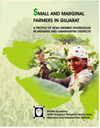 |
This booklet focuses on small and marginal farmer members of SEWA, specifically in Mehsana and Sabarkantha. The study highlights the disconnect between reality and perception in contribution to work, incidence of poverty, health hazards, health training, water shortage and cost of water, recent switches to machinery, share cropping, and the difference between large and small farm productivity.
|
|
| |
| Click Here to download |
|
“Hands That Roll Bidi” -A Socio-Economic Survey of Bidi Rollers from Murshidabad District (2005)
The first step to undertake any development work in an area is to understand the socio-economic conditions prevailing in the area. This will help to outline the activities as per the need. Thus, the major objectives outlined for the study are:
• To study the socio-economic conditions of the Bidi-rollers Households in Murshidabad district.
• To look for the available alternative employment opportunities in the selected areas.
Click Here to download |
Life Has Educated Me (2005)
 A book by Dr. Karl Osner is
jointly produced outcome from the reflections and sharing of a group of
participants in the Exposure and Dialogue Programme (EDP) "Member-based
organizations of poor women" which was carried out by Cornell
university and women in informal employment: Globalizing and
Organizing(WIEGO) in January 2005 at SEWA. EDP has taken
place at Jadibanagar slum upgrading project. The study "Life has
Educated Me" is a report by all the members of one of the exposure
groups. It was elaborated on not only by the external participants, but
also by the host lady and facilitators of the group. The book is
published in December -2005. A book by Dr. Karl Osner is
jointly produced outcome from the reflections and sharing of a group of
participants in the Exposure and Dialogue Programme (EDP) "Member-based
organizations of poor women" which was carried out by Cornell
university and women in informal employment: Globalizing and
Organizing(WIEGO) in January 2005 at SEWA. EDP has taken
place at Jadibanagar slum upgrading project. The study "Life has
Educated Me" is a report by all the members of one of the exposure
groups. It was elaborated on not only by the external participants, but
also by the host lady and facilitators of the group. The book is
published in December -2005.
Click Here to download
|
|
Towards Economic Freedom: The Impact of SEWA (2005)
This booklet, entitled "Towards
Economic Freedom: The Impact of SEWA" is part of a SEWA at Thirty
project that we, along with Dr. Martha Chen of WIEGO and Harvard
University, undertook in 2002 at SEWA's thirtieth anniversary. The
specific purpose of this first booklet is to take stock of SEWA's
impact over the past thirty years.
The booklet presents the evidence collected in 21 impact studies that
were explicitly designed to assess the impact on its members of
specific SEWA services and strategies or of SEWA as a whole. The
booklet further summarizes the impact of SEWA's organizing and related
strategies on specific trade groups as reported by SEWA organizers and
in SEWA documents. The booklet also includes a summary of SEWA's
impacts on the wider environment, including policies, laws, and
regulations; and it details the risks or crises faced by SEWA members
and the ability of SEWA members to cope with crises of various kinds.
Click Here to download |
Problems While Organising (2003)
Surashree Saha
Price: Rs. 100
SEWA has organized a state level cooperative federation with 6 major spokes: artisan, land- based, livestock, trade, service, and credit. Under these, 96 various women's cooperatives are settled. This booklet was drawn from a meeting to discuss the enhancement of the cooperative services and the outcome of their programs. These policies serve to strengthen the cooperative and help them function more efficiently. 6 issues regarding these policies were addressed and a plan for forward movement of the cooperatives thereby unfolded.
Click Here to download |
|
|
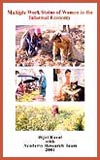 Multiple Work
Status of Women in Informal Economy Multiple Work
Status of Women in Informal Economy
(2001)
There is
an ongoing debate on how to deal with poverty in the area of
liberalisation and Globalisation. Unfortunately many of the solution
being proposed do not really correspond to existing situations,
especially in developing countries. This has led to the exclusion of
the majority of the poor who work in the informal economy from the
solution being proposed, not because there is any intention to exclude
them, but, just because they do ' fit in '. One of the ways in which
the workers in the informal economy do not ' fit in ' is that many of
them are not confined to one sector or to one type of work, but vary
their work depending on the season or the availability of work. In
other words a worker engages in many types of work throughout the year.
However,
especially for poor women, the income they earn from any one type of
work, is usually insufficient to meet their needs. So they are forced
to do more than one type of work even within the course of a day. In
SEWA we faced the problem both in classification as well as in
programming. Should a woman who sells vegetables and also makes kites
at home be classified as a vegetable vendor or as a kite maker ? Will
she be covered by social security fund for homebased workers ?
From this study,
we come to know that women are engaged in more than one work. But there
are some women who are still doing one work only, that may be because
they might be earning enough from one work or they want to do other
work but don’t get it or they don’t have the skill to do that
particular work.
Year: 2001
Study / research conducted by:
Bijal Raval, SEWA Academy Research Team
Click Here to download
|
|
|
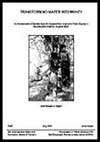 Transforming
Water into Money (2001) Transforming
Water into Money (2001)
The
conventional aims of domestic water supply projects are improved
welfare and public health. However, having more water close to the home
also has the potential of significant economic benefits. This is
particularly so in (semi)arid areas, where women spend long hours in
collecting drinking water and lack other water sources for productive
use, such as dairying, crafts, horticulture, etc. Women seldom have a
chance to influence the design and operation of water projects for
their productive use of water and time. This pilot research has
assessed in the field, and with the women and men concerned, the
relevance of these uses, their impact on gender relations and the
implications for policies, project design and operations management.
Year: May 2001
Study / research conducted by:
SEWA, FPI, IRC
Partner organisation:
SIDA
Click Here to download
|
|
|
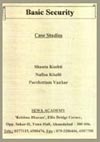 Life Stories of
13 SEWA Members regarding Basic Security Life Stories of
13 SEWA Members regarding Basic Security
(2001)
Thirteen
life stories of self employed women workers are recorded here with case
study methodology tracing their socio economic background, through
childhood and marriage, financial ordeals, how they face the ups and
downs, mostly downs of life, and how they overcome these. Their first
brushes with SEWA are recorded with the strong bonds that develop with
the organization over the years. Many of these beneficiaries themselves
become leaders and show the way out of deprivation to more afflicted
sisters.
Study /
research conducted by: Shanta Koshti, Nafisa Khalil, Purshottam Vankar
Click Here to download
|
|
|
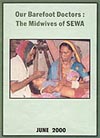 Our Barefoot Doctors: The Midwives Of SEWA (2000) Our Barefoot Doctors: The Midwives Of SEWA (2000)
In this book the role of dais is highlighted. There are some
recommendations by dais and by Sewa.
Year: 2000
Study / Research conducted by:
SEWA Academy
Click Here to download
|
|
|
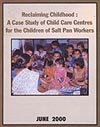 Reclaiming Childhood: A Case Study Of Childcare
Centers For The Children Of Saltpan Workers (2000) Reclaiming Childhood: A Case Study Of Childcare
Centers For The Children Of Saltpan Workers (2000)
In this book main issues and problems of saltpan workers are discussed.
Sewa conducted a survey of the salt workers of Surendranagar in 1996.
Study findings and recommendations are given in detail.
Year: 2000
Study / Research conducted by:
SEWA Academy
Click Here to download
|
|
|
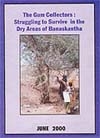 The Gum Collectors:
Struggling To Survive In The Dry Areas Of Banaskantha (2000) The Gum Collectors:
Struggling To Survive In The Dry Areas Of Banaskantha (2000)
This book
gives information about the poor situation of gum collectors. There is
a highlights of the survey carried out in 1997 by Sewa. There are some
recommendations to bring a change in the present policies and in the
situation of gum collectors. There is also a profile of one of the gum
collectors of Santalpur taluka.
Year:
2000
Study / Research conducted by:
SEWA Academy
Click Here to download
|
|
|
 The Fragrance Of Hard Work:
Women incense Stick Rollers Of Gujarat(2000) The Fragrance Of Hard Work:
Women incense Stick Rollers Of Gujarat(2000)
This book
provides information about agarbatti makers. Here is described the
procedure of agarbatti making, types of workers, success stories of
agarbatti rolling workers, occupational health problems, updates of
Sewa’s struggle for minimum wages and social security.
Year: 2000
Study / research conducted by:
SEWA Academy
Click Here to download
|
|
|
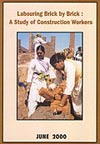 Labouring Brick By Brick: A
Study Of Construction Workers Labouring Brick By Brick: A
Study Of Construction Workers
(2000)
Outline
information is given about construction workers of Gujarat; how they
were organised and what are their concerns, etc. Key findings are given
of a survey conducted by Sewa about the socio-economic aspects of the
lives of construction workers of Ahmedabad city.
Year: 2000
Study / Research conducted by:
SEWA Academy
Click Here to download
|
|
|
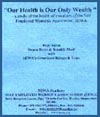 Our Health is our Only Wealth Our Health is our Only Wealth
(A study on the health of
members of the SEWA) Health Baseline (2000)
This
booklet is a study of the health of members of the SEWA conducted by
the authors with members of SEWA’s Grassroot Research Team. This report
focuses on members’ morbidity patterns, utility of health services,
reproductive health and response to SEWA’s health services. The study
takes into account socio economic status, awareness and addresses
dominant health needs with emphasis on reproductive health through the
life cycle. A summary of overall implications is also included.
Year: 2000
Study / research conducted by:
Bijal Raval, Sapna Desai, Surbhi Modi
Click Here to download
|
|
|
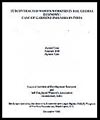 Subcontracted Woman Workers
in the Global Economy: Case of Garment Industry in India (1999) Subcontracted Woman Workers
in the Global Economy: Case of Garment Industry in India (1999)
This
report supported by the Women’s Economic and Legal Rights Programme of
the Asia Foundation, selected the case of garment manufacturing
industry and for detailed micro-level analysis the garment industry in
the city of Ahmedabad. The approach is comprehensive, right from
tracing the background and macroeconomic analysis, to policies related
to garment industry, with analysis of sub-contracting chains, focuses
on the women workers, their position vis a vis men and finally
discusses the organizing strategies for garment workers and policy
implications emerging from the study.
Year: 1999
Study / research conducted by:
Jeemol Unni, Namrata Bali, Jignasa Vyas
Click Here to download
|
|
|
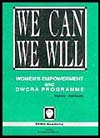 We Can We Will: Women's
Empowerment And DWCRA Programme (1994,2nd Edition : 1999 ) We Can We Will: Women's
Empowerment And DWCRA Programme (1994,2nd Edition : 1999 )
The paper
describes the lives of women in Banaskantha, the arid zone of North
Gujarat. It brings out Sewa’s experiences of working with our integral
scheme of the Government of India. DWCRA (Development of Women and
Children in Rural Areas) programme and how it led to the women’s
empowerment.
Year: 1994, 2nd
Edition: 1999
Study / Research conducted by:
Reema Nanavaty
Click Here to download
|
|
|
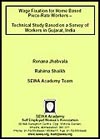 Wage Fixation For Homebased
Piece Rate Workers (1995) Wage Fixation For Homebased
Piece Rate Workers (1995)
This is a
technical paper, which was presented at the ILO conference, Geneva, in
June 1995. The paper is based on the study of homebased piece rate
workers and lay stress on the appropriate minimum wage fixation. The
paper has been translated in Gujarati.
Year: 1995
Study / Research conducted by:
Renana Jhabvala, Rahima Shaikh, SEWA Acadmy Team
Click Here to download
|
|
|
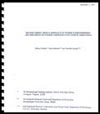 Beyond Credit:
Sewa’s Approach to Women’s Empowerment and Influence on Women’s
Reproductive Lives in Urban India (1995) Beyond Credit:
Sewa’s Approach to Women’s Empowerment and Influence on Women’s
Reproductive Lives in Urban India (1995)
This report presents findings from a small qualitative study of SEWA.
The methodology consisted of interviews with SEWA staff, review of
documents, on formal observation of activities at SEWA bank, Training
Academy and some urban neighbourhoods in which SEWA works and a series
of semi-structures interviews with 32 SEWA members and 18 nonmembers
from the same urban communities. This report highlights some of the
changes that are underway, both in the society at large, and in the
lives of the individual women, and discussed the role of SEWA as a
catalyst for change. The authors compare the findings from their
Bangladesh Research and reflect on the differences.
Year: 1995
Study /
Research conducted by: Sidney Schuller, Syed
Hashmi, and Harshida Pandit
Click Here to download
|
|
|
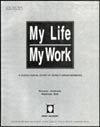 My Life My Work (1993) My Life My Work (1993)
The aim of
this study is to measure the impact of a grassroots women organisation.
This study examines not only economic aspects, but the sociological
aspects of the development as well. Sewa aims at making women
economically and socially self-reliant.This study indicates the
following issues: employment generation, income; assets creation,
education, childcare, participation in decision-making at family and
societal level, self-perception.
Year: 1993
Study / Research conducted by:
Renana Jhabvala, Namrata Bali
Partner organisation:
UNESCO
Click Here to download
|
|
|
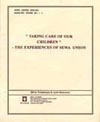 Taking Care Of Our
Children: The Experience Of SEWA Union (1992) Taking Care Of Our
Children: The Experience Of SEWA Union (1992)
The book offers a multidimensional examination of the rationale,
process and impact of Sewa’s work in collaboration with I.C.D.S.
programme. It highlights a case study, which brings forth the human
dimensions of social change. It depicts valuable lessons derived from
the Sewa’s insights of how woman’s’ work and childcare can be managed
efficiently. This paper has been translated in Gujarati and Hindi.
Year: 1992
Study / Research conducted by:
Mirai Chatterjee, Jyoti Macwan
Click Here to download
|
|
|
|
|